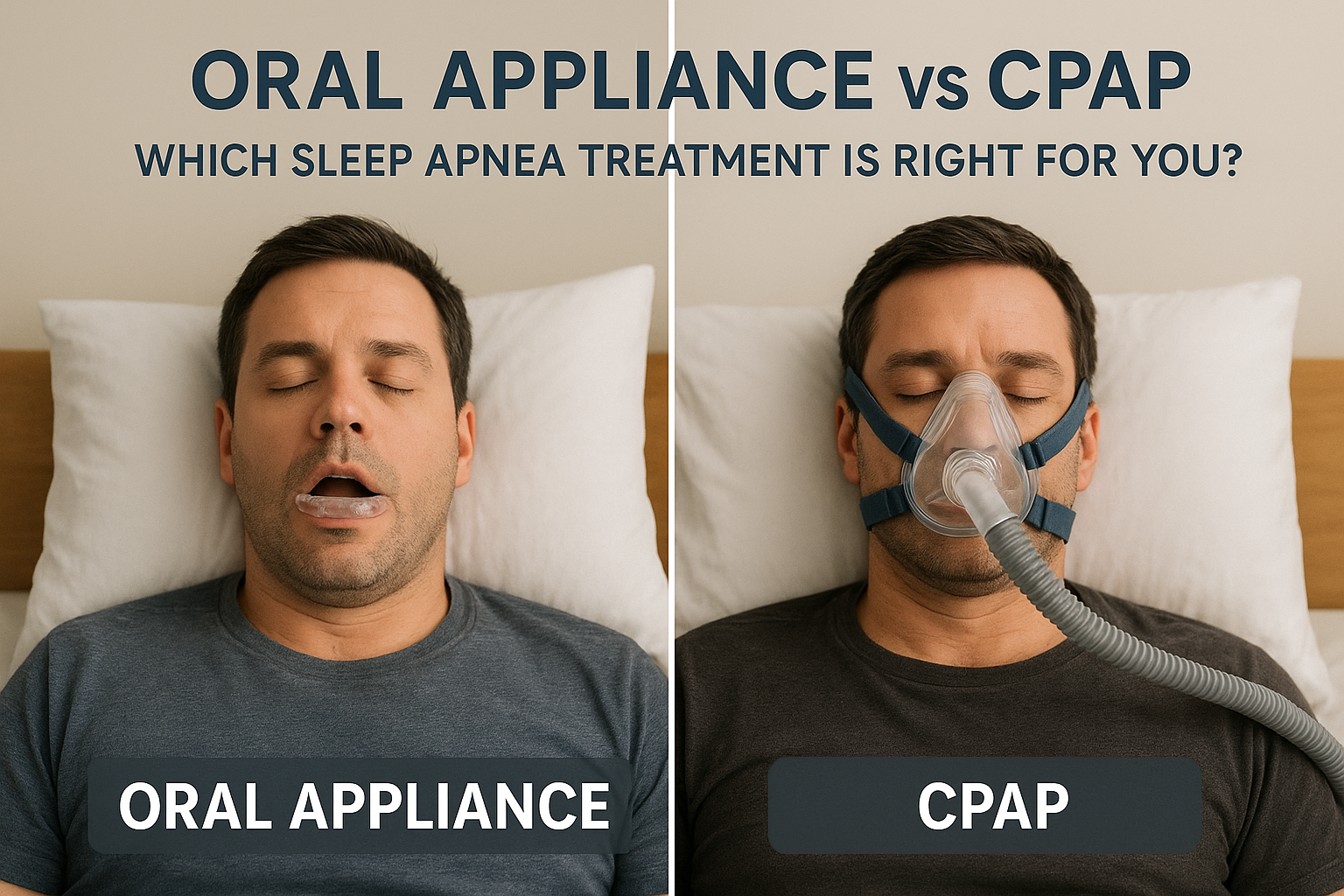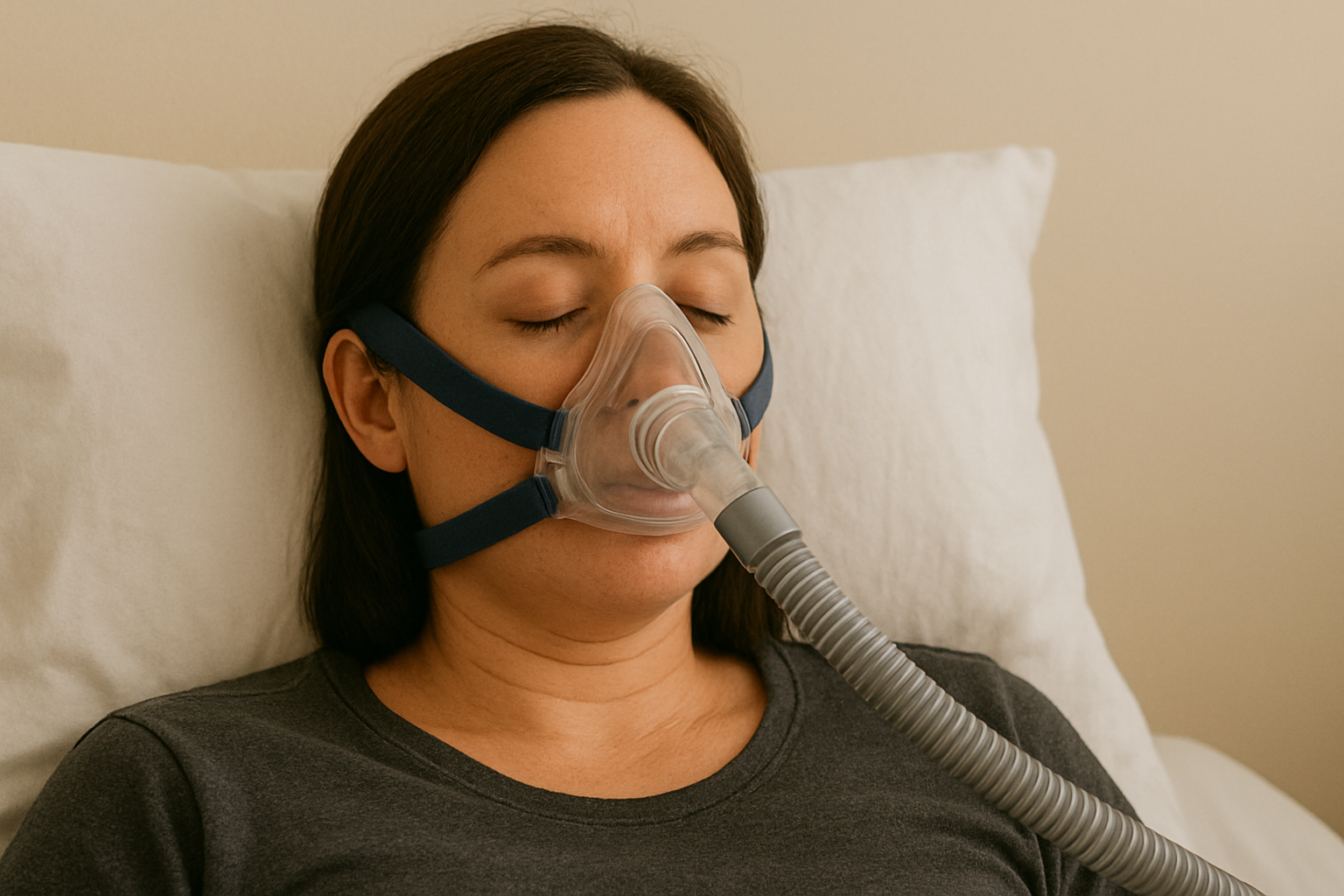Sleep apnea is a common but serious sleep disorder that affects millions of people worldwide. If you’ve been diagnosed, you may be wondering: Oral Appliance vs CPAP — which treatment is right for me? Both options are proven to help manage obstructive sleep apnea (OSA), but they work in very different ways and suit different lifestyles. In this guide, we’ll break down the differences, pros and cons, and real-world considerations so you can make an informed decision about your sleep health.
Understanding Sleep Apnea
Before diving into treatment options, it’s important to understand the condition itself.
- Obstructive Sleep Apnea (OSA): The most common type, where throat muscles relax during sleep, blocking the airway.
- Symptoms: Loud snoring, daytime fatigue, morning headaches, difficulty concentrating, mood changes.
- Risks if untreated: High blood pressure, heart disease, stroke, type 2 diabetes, and reduced quality of life.
If you suspect sleep apnea, a professional sleep study is usually recommended before deciding on treatment options. Preventive care, like regular dental check-ups, can also help your dentist catch early signs of sleep disorders and related oral health issues.
What Is CPAP Therapy?
CPAP (Continuous Positive Airway Pressure) is the most commonly prescribed treatment for moderate to severe sleep apnea.
- How it works: A CPAP machine delivers pressurized air through a mask to keep your airway open during sleep.
- Effectiveness: Considered the gold standard, CPAP is highly effective when used consistently.
Advantages of CPAP:
- Proven to work for mild, moderate, and severe cases.
- Reduces snoring significantly.
- Improves sleep quality and reduces daytime drowsiness.
Disadvantages of CPAP:
- Can feel uncomfortable or claustrophobic.
- Noise from the machine may disturb you or your partner.
- Requires nightly use and frequent cleaning.
- Travel inconvenience due to bulkiness.
What Is Oral Appliance Therapy?
Oral appliances, often called mandibular advancement devices (MADs) or dental appliances for sleep apnea, are custom-made mouthpieces fitted by a dentist.
- How it works: The device repositions your lower jaw slightly forward, preventing airway collapse during sleep.
- Best for: Mild to moderate sleep apnea, for patients with dental anxiety, oral appliances may feel less intimidating than CPAP masks, or those who want a simpler solution.
Advantages of Oral Appliances:
- Comfortable, lightweight, and easy to wear.
- Portable and discreet — ideal for travel.
- Quiet and non-invasive.
- Higher patient compliance compared to CPAP.
Disadvantages of Oral Appliances:
- Less effective for severe sleep apnea.
- May cause jaw discomfort, drooling, or bite changes.
- Requires professional fitting and periodic adjustments.
Oral Appliance vs CPAP: Side-by-Side Comparison
| Feature | CPAP | Oral Appliance |
| Effectiveness | Gold standard, especially for severe sleep apnea | Effective for mild to moderate cases |
| Comfort | Can feel bulky or uncomfortable | Small, discreet, more comfortable |
| Compliance Rates | Lower, due to discomfort and inconvenience | Higher, easier to use consistently |
| Noise Level | Machine produces some noise | Silent |
| Travel Convenience | Bulky, requires power source | Easy to carry, no power needed |
| Side Effects | Mask discomfort, dry mouth, skin irritation | Jaw soreness, bite changes |
| Cost | Higher upfront and ongoing maintenance | Lower initial cost, may need adjustments |
| Insurance Coverage | Often covered | Increasingly covered by dental/medical plans |
Oral Appliance vs CPAP: Effectiveness
- CPAP: Most effective for moderate to severe cases.
- Oral Appliance Therapy (OAT): Effective for mild to moderate cases and for patients who cannot tolerate CPAP.
Many patients who struggle with CPAP find oral appliance therapy a life-changing alternative that improves both sleep quality and compliance rates.
Oral Appliance vs CPAP: Comfort & Lifestyle Factors
Comfort often determines whether a patient sticks with treatment long-term.
- CPAP comfort issues: Mask leaks, skin irritation, and the sensation of forced air can be difficult for some patients.
- Oral appliance comfort benefits: Feels more natural, similar to wearing a sports mouthguard or retainer.
For active patients who travel frequently, oral appliances are usually more convenient.
Cost Comparison
- CPAP machines: $1,000–$3,000 plus ongoing mask/tubing replacements.
- Oral appliances: $1,500–$2,500, often covered by insurance and with fewer replacement needs.
When factoring in long-term compliance, oral appliances may provide better value if CPAP proves intolerable.
Insurance Coverage
Both treatments are increasingly covered by medical and dental insurance, though coverage depends on your provider and diagnosis severity. Learn more about Canadian dental care plan on our page.
Oral Appliance vs CPAP: Which Is Better for Mild vs Severe Sleep Apnea?
- Mild sleep apnea: Oral appliances are often recommended as first-line treatment.
- Moderate sleep apnea: Both treatments are effective; personal comfort and compliance should guide the choice.
- Severe sleep apnea: CPAP remains the gold standard, though some patients may benefit from a combination of treatments.
Pros and Cons
Pros of CPAP:
- Best results for severe cases
- Widely studied and clinically proven
Cons of CPAP:
- Uncomfortable for many patients
- Difficult for frequent travellers
Pros of Oral Appliances:
- Comfortable, portable, and discreet
- Higher compliance rates
Cons of Oral Appliances:
- Less effective for severe cases
- Potential bite or jaw side effects
Oral Appliance vs CPAP: Patient Reviews & Success Stories
Many patients at Arbutus North Dental who struggled with CPAP have found success with oral appliance therapy. Patients often report:
- Better sleep consistency
- Less snoring
- Improved energy levels
- Easier travel without bulky equipment
The Role of Your Dentist in Sleep Apnea Treatment
A qualified dentist trained in dental sleep medicine can:
– Evaluate your airway and oral health
– Fit you for a custom oral appliance
– Adjust and monitor your device for effectiveness
Oral Appliance or CPAP: Which One Is Right for You?
Ultimately, the right treatment depends on:
– Severity of your sleep apnea
– Your lifestyle, oral health and travel needs
– Comfort and compliance with the device
– Insurance and cost considerations
The best way to decide is by consulting with a sleep specialist and a dentist experienced in sleep apnea treatment.
Oral Appliance vs CPAP: FAQs
- Is oral appliance therapy as effective as CPAP?
For mild to moderate cases, yes. For severe cases, CPAP is usually more effective. - What are the side effects of oral appliances?
Mild jaw soreness, bite changes, or drooling, which usually improve with adjustment. - Can I try oral appliance therapy if CPAP doesn’t work for me?
Yes, many patients switch from CPAP to oral appliances due to comfort and compliance.
Conclusion: Take the First Step Toward Better Sleep
When weighing Oral Appliance vs CPAP, there’s no one-size-fits-all answer. CPAP may be the gold standard for severe sleep apnea, but oral appliance therapy offers a comfortable, convenient, and effective alternative for many patients.
If you’re struggling with sleep apnea, our team at Arbutus North Dental is here to help. From check-ups and cleanings to sleep apnea treatment, we provide comprehensive care to improve your health and quality of life.
Ready to take control of your sleep?
Contact us today to schedule a consultation and find out which Sleep Apnea treatment option is right for you.

